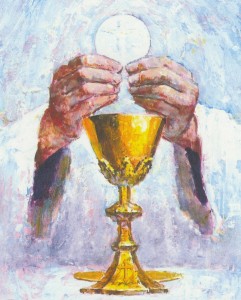Koinonia: Sharers in the Life of God
When we bless the cup at the Lord’s Table, aren’t we sharing in the blood of Christ? And when we break the bread, aren’t we sharing in the body of Christ?
1 Cor. 10:19 NLT
I was raised in a tradition that taught that the Lord’s Supper (i.e., Holy Eucharist or Holy Communion) was merely symbolic. Â By the partaking of the grape juice and the consumption of a cracker, a simple memorial meal was offered to give thanks for the death of Christ. I always appreciated these quarterly services, but I thought there must be something more to this solemn ritual. The spiritual experience of the celebration of our Lord’s Body and Blood had to be more significant than just a service of memory by mental recall.
As a young Christian, I studied Paul’s First Letter to the Corinthians faithfully and diligently. In my studies, I found key biblical words which provided deeper meaning to the celebration of the Lord’s Supper (1 Cor. 10: 14-22) than previously I had been taught. Consequently, I realized that large segments of the Body of Christ also made that same discovery and practiced those truths for centuries.
One of those words of significance was the Greek word, koinonia (1 Cor. 10: 16).  Koinonia is translated as share (NLT, NASU, NRSV), participate (NIV, ESV), partake (The Message), fellowship, commune (NKJV), and union (Douay-Rheims). As the reader can see, Koinonia is a word of great depth and meaning. The Apostle Paul is saying that when we receive the elements of wine and bread; we are sharing, participating, partaking, fellowshipping, communing, and uniting with the risen Christ. In Holy Communion, we experience afresh all the benefits of the finished work of Christ and encounter through Christ’s presence sanctifying grace to live the Christian life.
When we drink the Blood of Christ and and eat of the Body of Christ . . .
1. We share in the power of the resurrected Christ. He is risen and therefore alive, and by his power, we are made victorious.
2. We participate in the very life of God. We become receivers of the divine nature (2 Peter 1:4).
3. We partake of his grace. Sanctifying grace to live the Christian life: strength and power to respond to every life situation according to the will of God.
4. We fellowship with God and all his saints as the congregation enters into heavenly worship (Rev. 4 & 5).
5. We commune with Christ enjoying afresh his love, grace, and covenant promises.
6. We are brought into union with the heart and will of God. Our hearts are “righted” as we receive Christ the Body and Blood of Christ. By partaking, we submit to his Lordship afresh conforming our hearts and wills to his designs and purposes.
In summary, the Apostle Paul describes our Eucharistic meal as a koinonia. Koinonia means sharing, partaking, fellowship, communing, and unifying participation in the life of God. When we drink the Blood and eat the Body of our Lord Jesus Christ: we commune with Christ, we share in his resurrection, we partake of his grace, we fellowship with God and his saints, and we are brought into union with his heart and will. In short, we become partakers—people who share in the very life of God.
Daily communion and participation in his holy Body and Blood of Christ is a good and helpful practice. Christ clearly says, “He who eats My Flesh and drinks My Blood has eternal life.” Who doubts that to partake of life continually is really to have life in abundance? For myself, I communicate four times a week . . . Â on the Lord’s Day, on Wednesday, on Friday, and on Saturday, and on the other days if there is a commemoration of a martyr.
St. Basil the Great of Caesarea (375 A.D.) cited in What the Church Fathers Say About  . . . ed., George W. Grube (Minneapolis, MN: Light and Life, 1996), 8.








